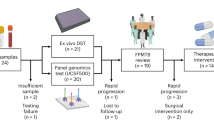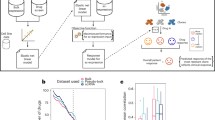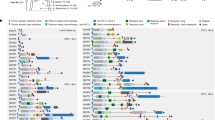Abstract
Wingless-type protein (Wnt)/β-catenin pathway alterations in non-small cell lung cancer (NSCLC) are associated with poor prognosis and resistance. In 598 stage III–IV NSCLC patients receiving platinum-based chemotherapy at the MD Anderson Cancer Center (MDACC), we correlated survival with 441 host single-nucleotide polymorphisms (SNPs) in 50 Wnt pathway genes. We then assessed the most significant SNPs in 240 Mayo Clinic patients receiving platinum-based chemotherapy for advanced NSCLC, 127 MDACC patients receiving platinum-based adjuvant chemotherapy and 340 early stage MDACC patients undergoing surgery alone (cohorts 2–4). In multivariate analysis, survival correlates with SNPs for AXIN2 (rs11868547 and rs4541111, of which rs11868547 was assessed in cohorts 2–4), Wnt-5B (rs12819505), CXXC4 (rs4413407) and WIF-1 (rs10878232). Median survival was 19.7, 15.6 and 10.7 months for patients with 1, 2 and 3–5 unfavorable genotypes, respectively (P=3.8 × 10−9). Survival tree analysis classified patients into two groups (median survival time 11.3 vs 17.3 months, P=4.7 × 10−8). None of the SNPs achieved significance in cohorts 2–4; however, there was a trend in the same direction as cohort 1 for 3 of the SNPs. Using online databases, we found rs10878232 displayed expression quantitative trait loci correlation with the expression of LEMD3, a neighboring gene previously associated with NSCLC survival. In conclusion, results from cohort 1 provide further evidence for an important role for Wnt in NSCLC. Investigation of Wnt inhibitors in advanced NSCLC would be reasonable. Lack of an SNP association with outcome in cohorts 2–4 could be due to low statistical power, impact of patient heterogeneity or false-positive observations in cohort 1.
This is a preview of subscription content, access via your institution
Access options
Subscribe to this journal
Receive 6 print issues and online access
$259.00 per year
only $43.17 per issue
Buy this article
- Purchase on Springer Link
- Instant access to full article PDF
Prices may be subject to local taxes which are calculated during checkout




Similar content being viewed by others
References
Jemal A, Bray F, Center MM, Ferlay J, Ward E, Forman D . Global cancer statistics. Cancer J Clin 2011; 61: 69–90.
Higgins MJ, Ettinger DS . Chemotherapy for lung cancer: the state of the art in 2009. Expert Rev Anticancer Ther 2009; 9: 1365–1378.
Stinchcombe TE, Lee CB, Socinski MA . Current approaches to advanced-stage non-small-cell lung cancer: first-line therapy in patients with a good functional status. Clin Lung Cancer 2006; 7 (Suppl 4): S111–S117.
Kepka L, Sprawka A, Casas F, Abdel-Wahab S, Agarwal JP, Jeremic B . Combination of radiotherapy and chemotherapy in locally advanced NSCLC. Expert Rev Anticancer Ther 2009; 9: 1389–1403.
Fietkau R . Stage-III NSClC: multimodality therapy for inoperable tumours. Lung Cancer 2004; 45 (Suppl 2): S113–S123.
Pignon JP, Tribodet H, Scagliotti GV, Douillard JY, Shepherd FA, Stephens RJ et al. Lung adjuvant cisplatin evaluation: a pooled analysis by the LACE Collaborative Group. J Clin Oncol 2008; 26: 3552–3559.
Mazieres J, He B, You L, Xu Z, Jablons DM . Wnt signaling in lung cancer. Cancer Lett 2005; 222: 1–10.
Takahashi-Yanaga F, Kahn M . Targeting Wnt signaling: can we safely eradicate cancer stem cells? Clin Cancer Res 2010; 16: 3153–3162.
Teng Y, Wang X, Wang Y, Ma D . Wnt/beta-catenin signaling regulates cancer stem cells in lung cancer A549 cells. Biochem Biophys Res Commun 2010; 392: 373–379.
van Tienen FH, Laeremans H, van der Kallen CJ, Smeets HJ . Wnt5b stimulates adipogenesis by activating PPARgamma, and inhibiting the beta-catenin dependent Wnt signaling pathway together with Wnt5a. Biochem Biophys Res Commun 2009; 387: 207–211.
Kojima T, Shimazui T, Hinotsu S, Joraku A, Oikawa T, Kawai K et al. Decreased expression of CXXC4 promotes a malignant phenotype in renal cell carcinoma by activating Wnt signaling. Oncogene 2009; 28: 297–305.
Yang ZQ, Zhao Y, Liu Y, Zhang JY, Zhang S, Jiang GY et al. Downregulation of HDPR1 is associated with poor prognosis and affects expression levels of p120-catenin and beta-catenin in nonsmall cell lung cancer. Mol Carcinog 2010; 49: 508–519.
Stewart DJ . The Wnt signaling pathway in non-small cell lung cancer. J Natl Cancer Inst 2014; 106: djt356.
Hirata H, Hinoda Y, Nakajima K, Kikuno N, Yamamura S, Kawakami K et al. Wnt antagonist gene polymorphisms and renal cancer. Cancer 2009; 115: 4488–4503.
Tuupanen S, Turunen M, Lehtonen R, Hallikas O, Vanharanta S, Kivioja T et al. The common colorectal cancer predisposition SNP rs6983267 at chromosome 8q24 confers potential to enhanced Wnt signaling. Nat Genet 2009; 41: 885–890.
Wang X, Goode EL, Fredericksen ZS, Vierkant RA, Pankratz VS, Liu-Mares W et al. Association of genetic variation in genes implicated in the beta-catenin destruction complex with risk of breast cancer. Cancer Epidemiol Biomarkers Prev 2008; 17: 2101–2108.
Agalliu I, Suuriniemi M, Prokunina-Olsson L, Johanneson B, Collins FS, Stanford JL et al. Evaluation of a variant in the transcription factor 7-like 2 (TCF7L2) gene and prostate cancer risk in a population-based study. Prostate 2008; 68: 740–747.
Huang SP, Ting WC, Chen LM, Huang LC, Liu CC, Chen CW et al. Association analysis of Wnt pathway genes on prostate-specific antigen recurrence after radical prostatectomy. Ann Surg Oncol 2010; 17: 312–322.
Ting WC, Chen LM, Pao JB, Yang YP, You BJ, Chang TY et al. Common genetic variants in Wnt signaling pathway genes as potential prognostic biomarkers for colorectal cancer. PloS One 2013; 8: e56196.
Kanzaki H, Ouchida M, Hanafusa H, Yano M, Suzuki H, Aoe M et al. Single nucleotide polymorphism of the AXIN2 gene is preferentially associated with human lung cancer risk in a Japanese population. Int J Mol Med 2006; 18: 279–284.
Storey JD . A direct approach to false discovery rates. J R Stat Soc B 2002; 64: 479–498.
Yang TP, Beazley C, Montgomery SB, Dimas AS, Gutierrez-Arcelus M, Stranger BE et al. Genevar: a database and Java application for the analysis and visualization of SNP-gene associations in eQTL studies. Bioinformatics 2010; 26: 2474–2476.
Xia K, Shabalin AA, Huang S, Madar V, Zhou YH, Wang W et al. seeQTL: a searchable database for human eQTLs. Bioinformatics 2012; 28: 451–452.
Yang LH, Xu HT, Li QC, Jiang GY, Zhang XP, Zhao HY et al. Abnormal hypermethylation and clinicopathological significance of Axin gene in lung cancer. Tumour Biol 2013; 34: 749–757.
Xu HT, Wei Q, Liu Y, Yang LH, Dai SD, Han Y et al. Overexpression of axin downregulates TCF-4 and inhibits the development of lung cancer. Ann Surg Oncol 2007; 14: 3251–3259.
Heijink IH, de Bruin HG, van den Berge M, Bennink LJ, Brandenburg SM, Gosens R et al. Role of aberrant WNT signalling in the airway epithelial response to cigarette smoke in chronic obstructive pulmonary disease. Thorax 2013; 68: 709–716.
Wei Q, Zhao Y, Yang ZQ, Dong QZ, Dong XJ, Han Y et al. Dishevelled family proteins are expressed in non-small cell lung cancer and function differentially on tumor progression. Lung Cancer 2008; 62: 181–192.
Zhao Y, Yang ZQ, Wang Y, Miao Y, Liu Y, Dai SD et al. Dishevelled-1 and dishevelled-3 affect cell invasion mainly through canonical and noncanonical Wnt pathway, respectively, and associate with poor prognosis in nonsmall cell lung cancer. Mol Carcinog 2010; 49: 760–770.
Uematsu K, He B, You L, Xu Z, McCormick F, Jablons DM . Activation of the Wnt pathway in non small cell lung cancer: evidence of dishevelled overexpression. Oncogene 2003; 22: 7218–7221.
Wissmann C, Wild PJ, Kaiser S, Roepcke S, Stoehr R, Woenckhaus M et al. WIF1, a component of the Wnt pathway, is down-regulated in prostate, breast, lung, and bladder cancer. J Pathol 2003; 201: 204–212.
Korobko EV, Kalinichenko SV, Shepelev MV, Zborovskaia IB, Allakhverdiev AK, Zinov'eva MV et al. [Suppression of WIFI transcript and protein in non-small cell lung carcinomas]. Mol Gen Mikrobiol Virusol 2007; 2: 13–18.
Suzuki M, Wada H, Yoshino M, Tian L, Shigematsu H, Suzuki H et al. Molecular characterization of chronic obstructive pulmonary disease-related non-small cell lung cancer through aberrant methylation and alterations of EGFR signaling. Ann Surg Oncol 2010; 17: 878–888.
Lee SM, Park JY, Kim DS . Wif1 hypermethylation as unfavorable prognosis of non-small cell lung cancers with EGFR mutation. Mol Cell 2013; 36: 69–73.
Liu YL, Yang HP, Zhou XD, Gong L, Tang CL, Wang HJ . The hypomethylation agent bisdemethoxycurcumin acts on the WIF-1 promoter, inhibits the canonical Wnt pathway and induces apoptosis in human non-small-cell lung cancer. Curr Cancer Drug Targets 2011; 11: 1098–1110.
Kim J, You L, Xu Z, Kuchenbecker K, Raz D, He B et al. Wnt inhibitory factor inhibits lung cancer cell growth. J Thorac Cardiovasc Surg 2007; 133: 733–737.
Sotelo J, Esposito D, Duhagon MA, Banfield K, Mehalko J, Liao H et al. Long-range enhancers on 8q24 regulate c-Myc. Proc Natl Acad Sci USA 2010; 107: 3001–3005.
Huang Y, Shen XJ, Zou Q, Wang SP, Tang SM, Zhang GZ . Biological functions of microRNAs: a review. J Physiol Biochem 2010; 67: 129–139.
Vilborg A, Wilhelm MT, Wiman KG . Regulation of tumor suppressor p53 at the RNA level. J Mol Med 2010; 88: 645–652.
Reamon-Buettner SM, Cho SH, Borlak J . Mutations in the 3'-untranslated region of GATA4 as molecular hotspots for congenital heart disease (CHD). BMC Med Genet 2007; 8: 38.
Markovic D, Challiss RA . Alternative splicing of G protein-coupled receptors: physiology and pathophysiology. Cell Mol Life Sci 2009; 66: 3337–3352.
Farrall M . Quantitative genetic variation: a post-modern view. Hum Mol Genet 2004; 13 Spec No 1: R1–R7.
Stranger BE, Montgomery SB, Dimas AS, Parts L, Stegle O, Ingle CE et al. Patterns of cis regulatory variation in diverse human populations. PLoS Genet 2012; 8: e1002639.
Dimas AS, Deutsch S, Stranger BE, Montgomery SB, Borel C, Attar-Cohen H et al. Common regulatory variation impacts gene expression in a cell type-dependent manner. Science 2009; 325: 1246–1250.
Nica AC, Parts L, Glass D, Nisbet J, Barrett A, Sekowska M et al. The architecture of gene regulatory variation across multiple human tissues: the MuTHER study. PLoS Genet 2011; 7: e1002003.
Grundberg E, Small KS, Hedman AK, Nica AC, Buil A, Keildson S et al. Mapping cis- and trans-regulatory effects across multiple tissues in twins. Nat Genet 2012; 44: 1084–1089.
Lin F, Morrison JM, Wu W, Worman HJ . MAN1, an integral protein of the inner nuclear membrane, binds Smad2 and Smad3 and antagonizes transforming growth factor-beta signaling. Hum Mol Genet 2005; 14: 437–445.
Couto AR, Bruges-Armas J, Peach CA, Chapman K, Brown MA, Wordsworth BP et al. A novel LEMD3 mutation common to patients with osteopoikilosis with and without melorheostosis. Calcif Tissue Int 2007; 81: 81–84.
Wu X, Wang L, Ye Y, Aakre JA, Pu X, Chang GC et al. Genome-wide association study of genetic predictors of overall survival for non-small cell lung cancer in never smokers. Cancer Res 2013; 73: 4028–4038.
Rami-Porta R, Crowley JJ, Goldstraw P . The revised TNM staging system for lung cancer. Ann Thorac Cardiovasc Surg 2009; 15: 4–9.
Acknowledgements
This study was supported in part by NIH grants R01 CA111646, P50 CA070907, R01 CA55769, R01-CA80127 and R01-CA84354, and the Mayo Foundation fund.
Author information
Authors and Affiliations
Corresponding author
Ethics declarations
Competing interests
The authors declare no conflict of interest.
Rights and permissions
About this article
Cite this article
Stewart, D., Chang, D., Ye, Y. et al. Wnt signaling pathway pharmacogenetics in non-small cell lung cancer. Pharmacogenomics J 14, 509–522 (2014). https://doi.org/10.1038/tpj.2014.21
Received:
Revised:
Accepted:
Published:
Issue Date:
DOI: https://doi.org/10.1038/tpj.2014.21
This article is cited by
-
CBX4 deletion promotes tumorigenesis under KrasG12D background by inducing genomic instability
Signal Transduction and Targeted Therapy (2023)
-
METTL3 promotes the malignancy of non-small cell lung cancer by N6-methyladenosine modifying SFRP2
Cancer Gene Therapy (2023)
-
Unraveling the prevalence of various signalling pathways in non-small-cell lung cancer: a review
Molecular and Cellular Biochemistry (2023)
-
Apatinib suppresses lung cancer stem-like cells by complex interplay between β-catenin signaling and mitochondrial ROS accumulation
Cell Death Discovery (2021)
-
MiR-216a-5p targets TCTN1 to inhibit cell proliferation and induce apoptosis in esophageal squamous cell carcinoma
Cellular & Molecular Biology Letters (2019)



